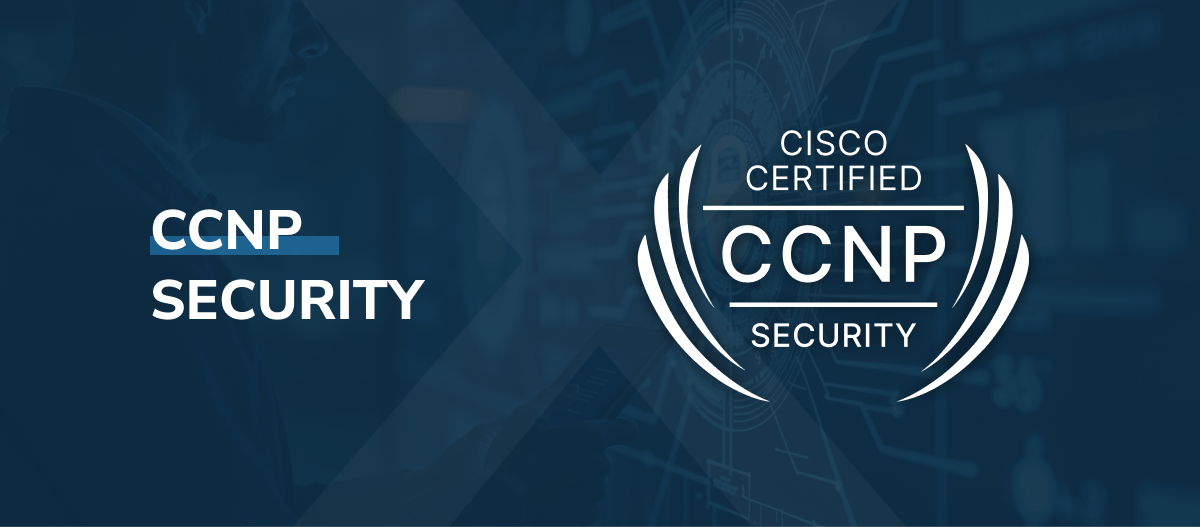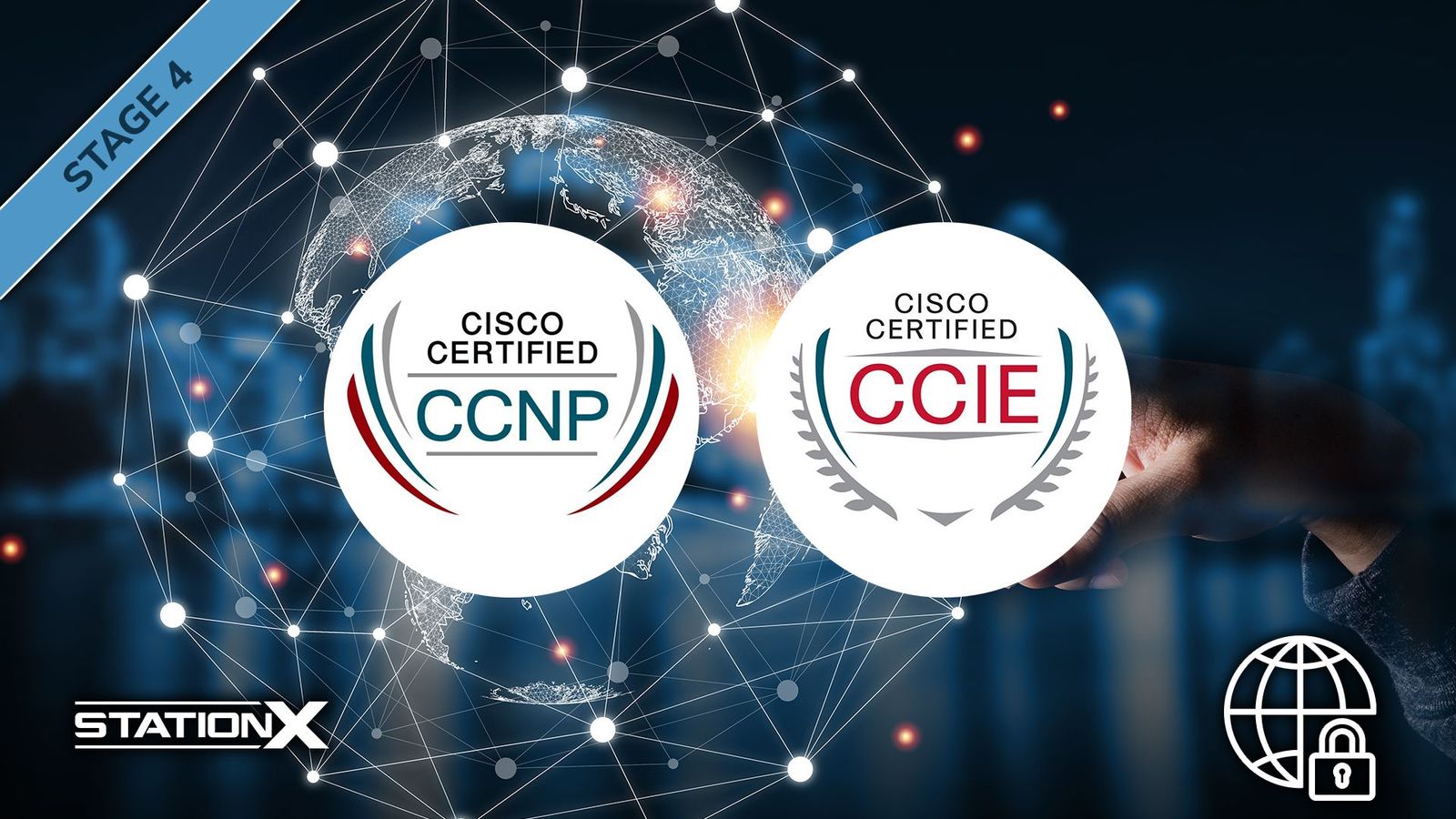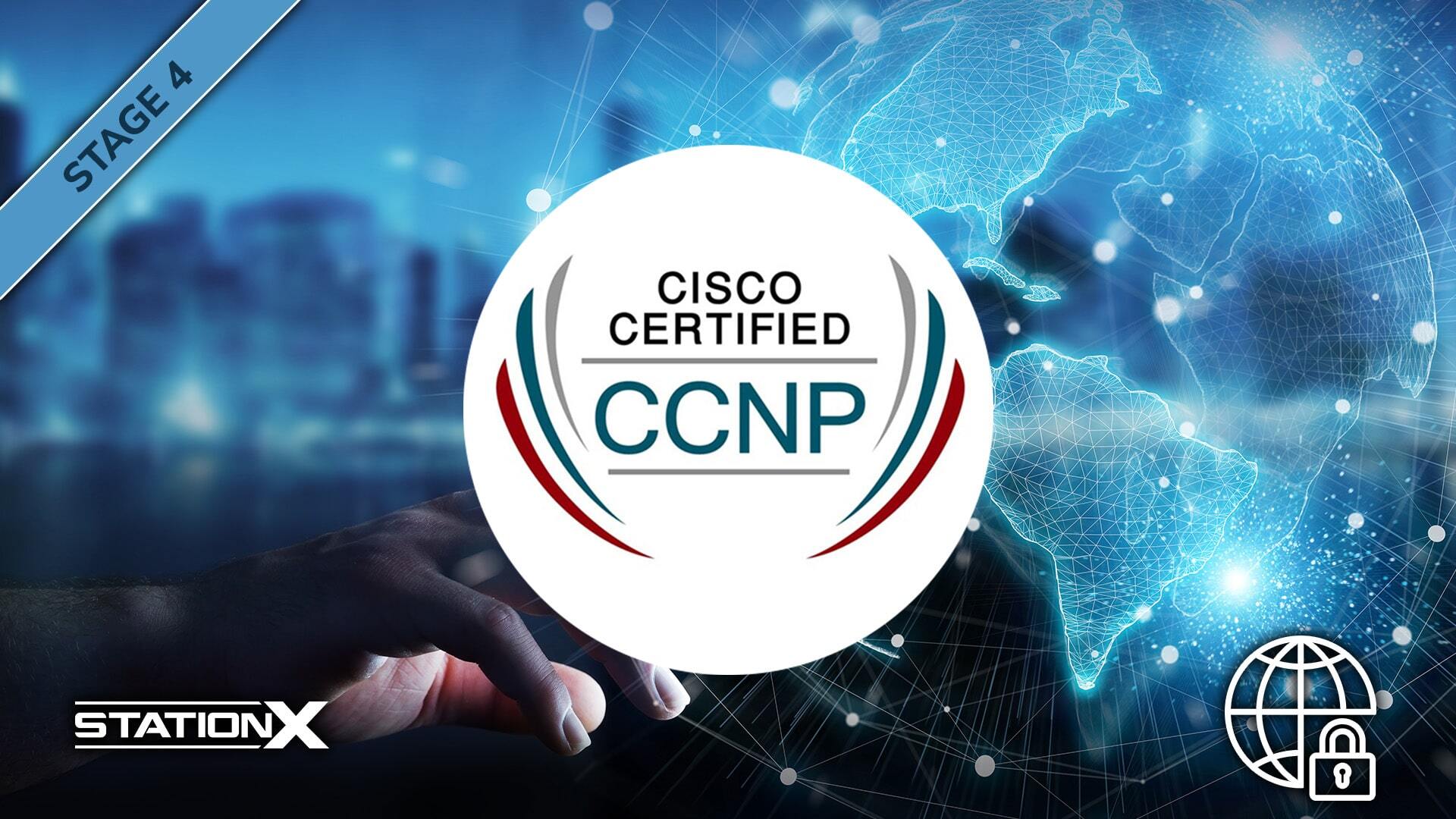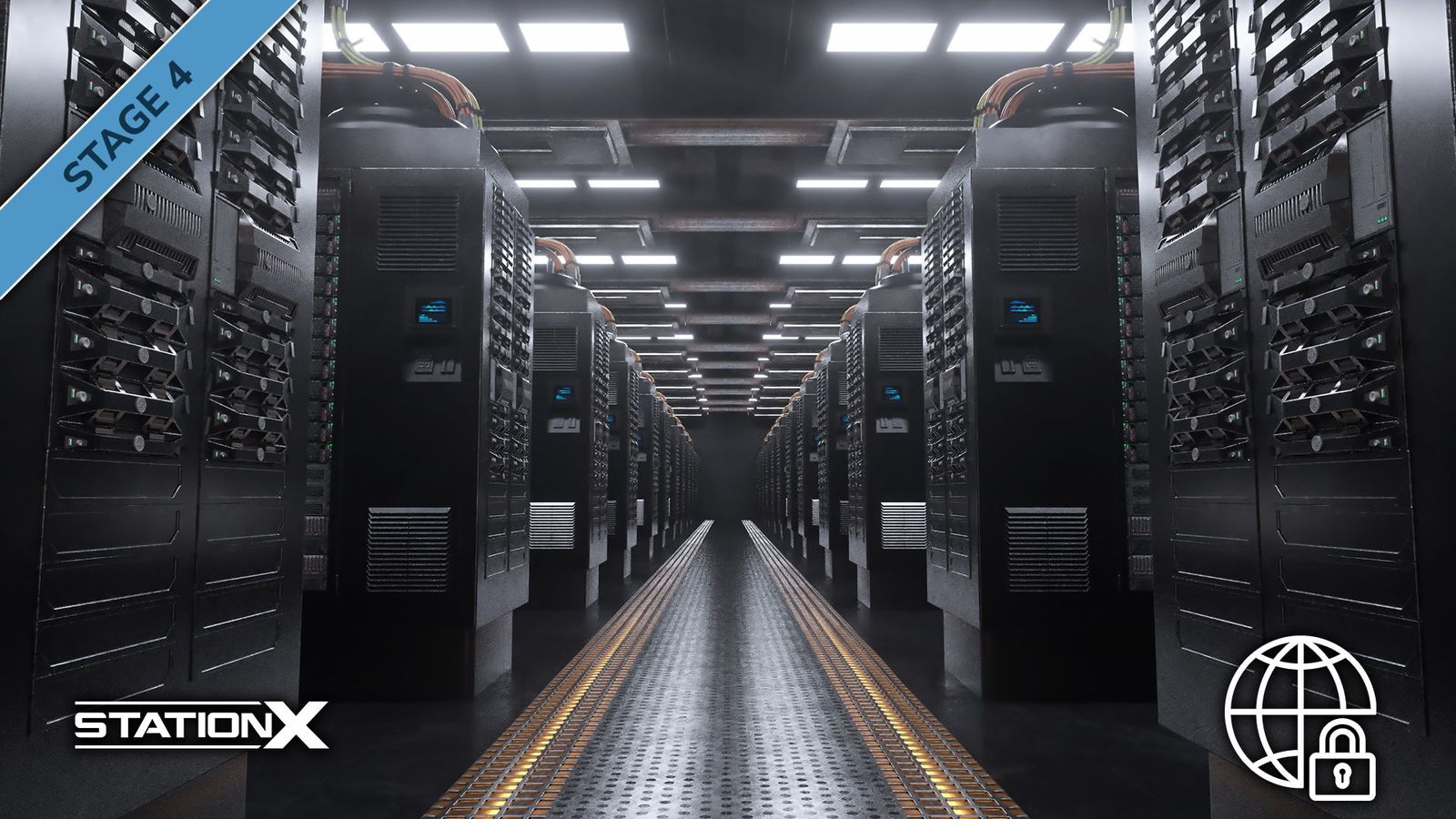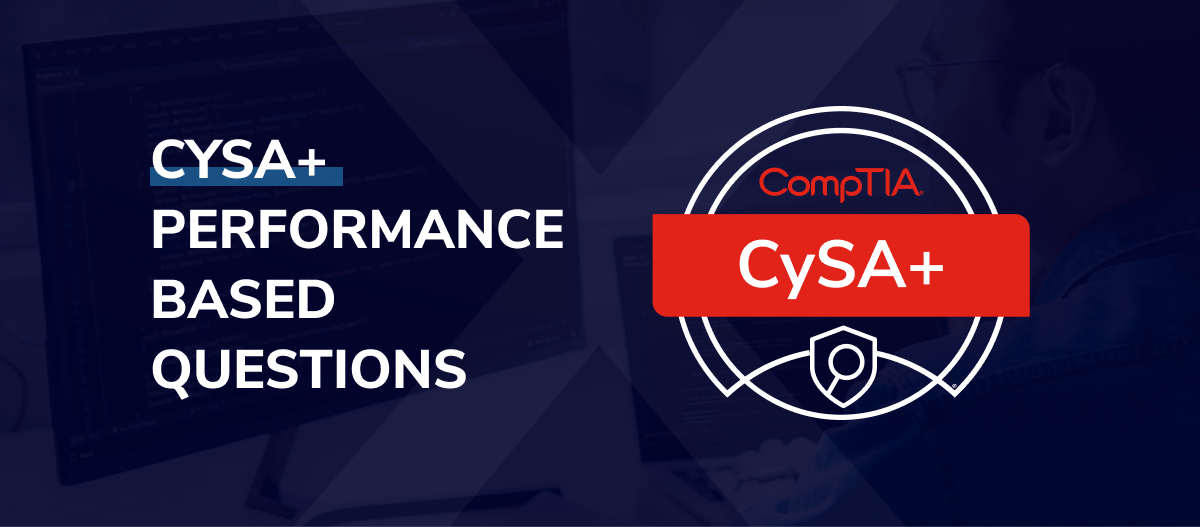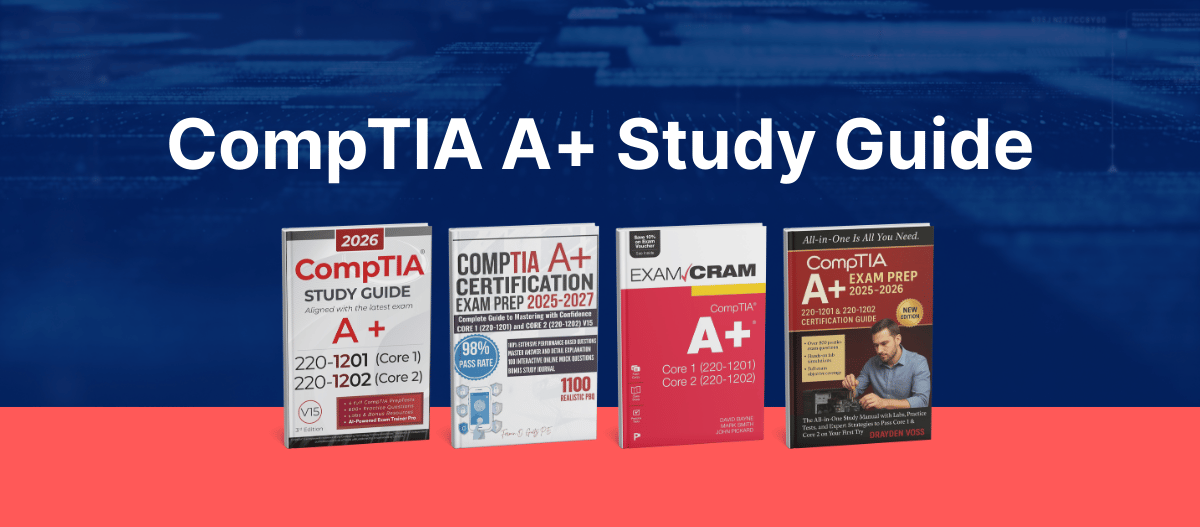Whether you’re a new or seasoned IT professional, you may have heard of the CCNP Security certification and now wonder what it is or whether it’s worth pursuing.
Well, you’ve found the right place to find out! This article will have a detailed breakdown of the CCNP Security exam.
We'll provide information about the exam, how to earn the CCNP Security certification, the core and concentration exams, and the salary and job prospects for CCNP Security holders.
Depending on your career goals, you’ll learn about the difficulty of the exam and whether it’s worth pursuing.
So, without further ado, let’s dive into CCNP Security.
What Is the Cisco CCNP Security Certification?
The CCNP Security certification is a vendor-specific—in this case, Cisco—certification in security infrastructure. It includes network, cloud, and content security, endpoint protection and detection, secure network access, visibility, and enforcement.
CCNP Security is more advanced than CCNA and belongs to Stage 4 (cyber security specialization) of our career roadmap. Cisco categorizes CCNP as Professional-level, compared with Associate-level for CCNA.
Certified individuals can protect the networks and data in enterprise environments with professional network security skills.
The target audience of CCNP Security is IT professionals with three to five years of experience implementing security solutions intending to specialize in a focus area of their choice, and the exam assesses candidates on advanced networking knowledge and skills.
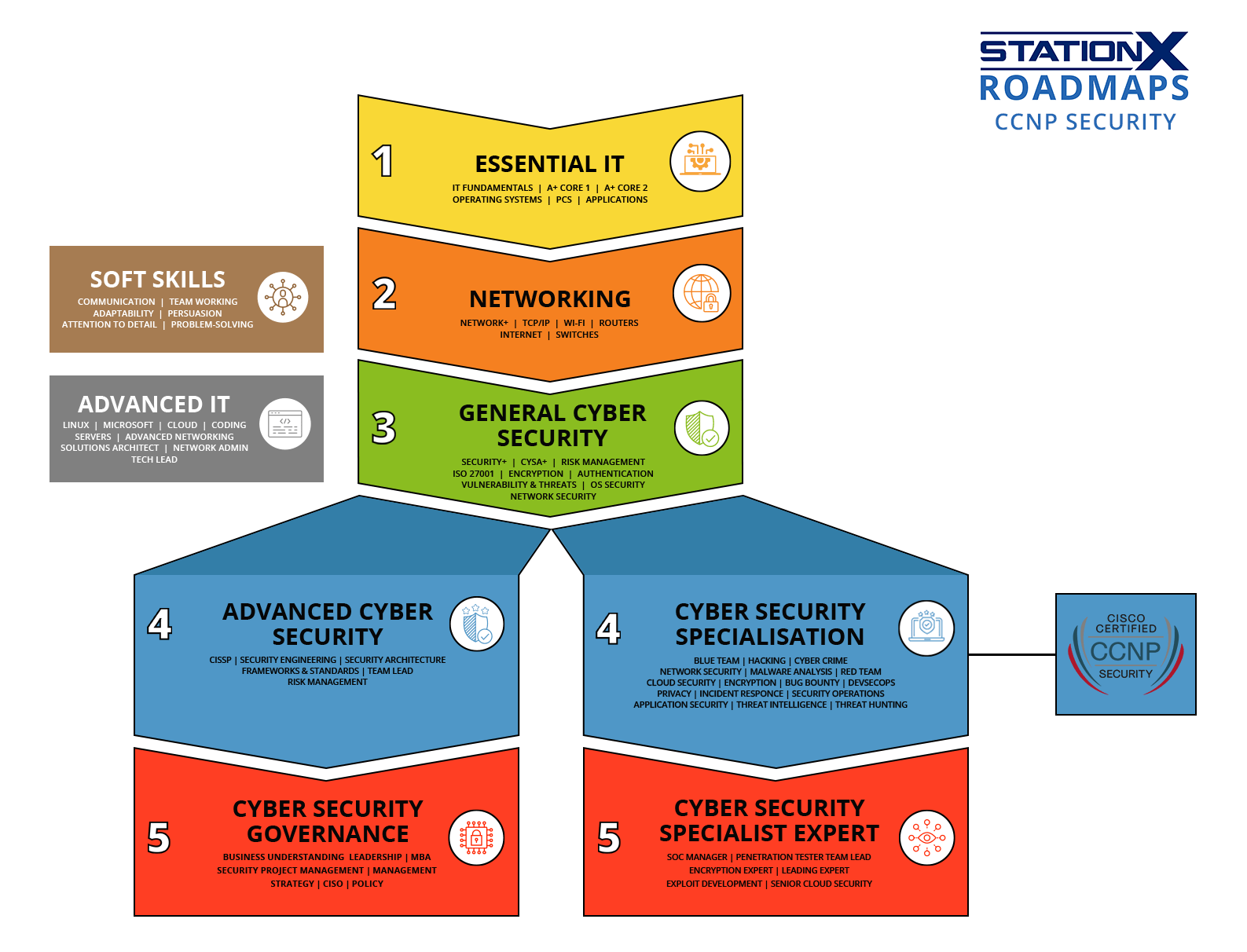
Different CCNP certifications are available, each with their own focus:
- CCNP Security (the one you’re reading about): cyber security
- CCNP Collaboration: technology powering the hybrid workforce
- CCNP Data Center: data center operations
- CCNP Enterprise: enterprise network infrastructure
- CCNP Service Provider: (managed) service providers
The core and concentration exams for each CCNP vary, and none of the other CCNPs have a security focus. Instead, they go in-depth on specific networking and cloud topics.
How Do I Earn CCNP Security?
You must pass two exams: the CCNP Core exam (300-701 SCOR) and any one of the seven CCNP Security concentration exams.
The CCNP Security exam has no formal prerequisites, so you can skip lesser certifications like CCNA and prepare for CCNP Security now. However, you’ll still need a robust grasp of Cisco networking concepts. You’re off to a great start if you already have your CCNA.
Each exam includes a mix of questions testing you on a broad range of skills. The most common question types are multiple-choice, drag-and-drop, and lab simulations.
The multiple-choice questions may ask you about networking concepts or the correct decisions to make given a scenario, while the simulations aim to assess your abilities in hands-on configuration and troubleshooting.
Since you must be able to solve different question types quickly and accurately enough, time management is paramount.
CCNP Security is an intense exam that tests the combination of your theoretical knowledge and practical skills. The key is understanding how various parts of a network interact. Passing the exam equips certified professionals with essential skills to handle the problems dynamic enterprise network environments face.
The passing score for each core and concentration exam varies owing to Cisco’s confidential scoring mechanism, but it is typically around 80%. Different questions have a different weight. Complex questions like simulations may have more points, so prioritizing your studies on weightier topics and questions is a viable strategy.
The core exam costs $400 USD, and each concentration exam costs $300 USD. Hence, the total exam fee is $700 USD unless offset by your Cisco Learning Credits. It’s a hefty amount, but well worth it once you read ahead to this article’s Salary and Jobs section.
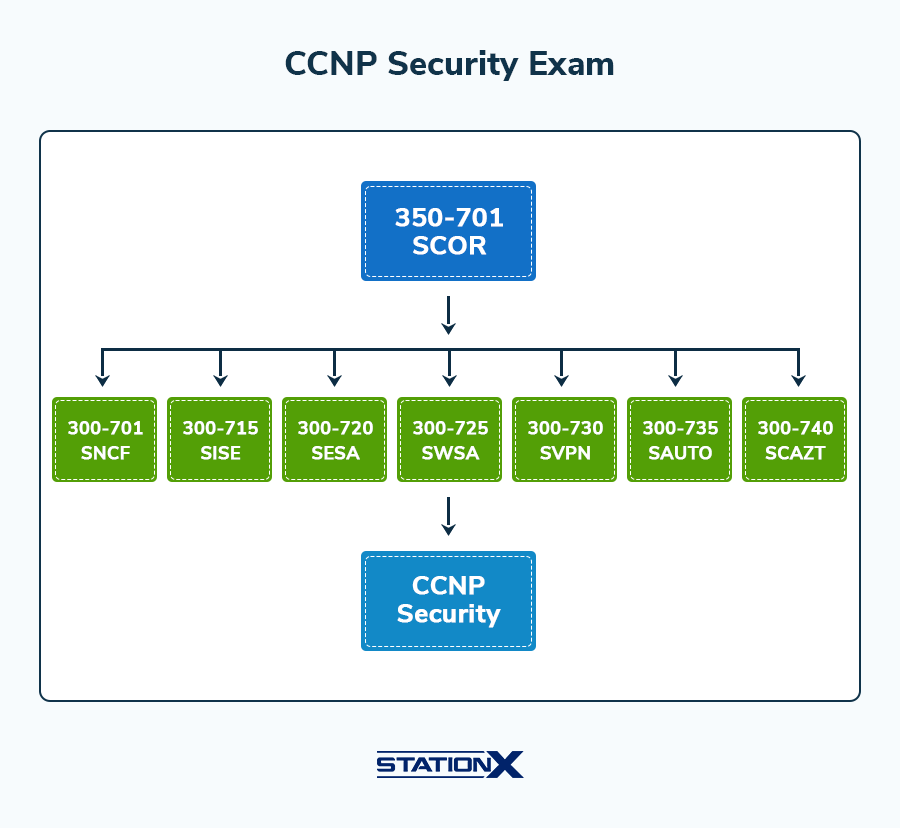
The CCNP Core Exam
The CCNP Security Core exam code is 350-701 SCOR, and the topic is “Implementing and Operating Cisco Security Core Technologies.”
It’s a 120-minute exam of approximately 90-120 questions assessing your knowledge of the implementation and operation of core security technologies, including network security, cloud security, content security, endpoint protection and detection, secure network access, visibility, and enforcement.
The exam price is $400 USD, but you can use Cisco Learning Credits to pay for it.
It’s such a crucial exam that passing 350-701 SCOR also helps you meet the qualifying core exam requirement for the Expert-level CCIE Security certification—which is more advanced than CCNP Security—and the “Cisco Certified Specialist - Security Core” specialist certification. If you intend to obtain CCIE Security soon afterward, this exam will kill two birds with one stone.
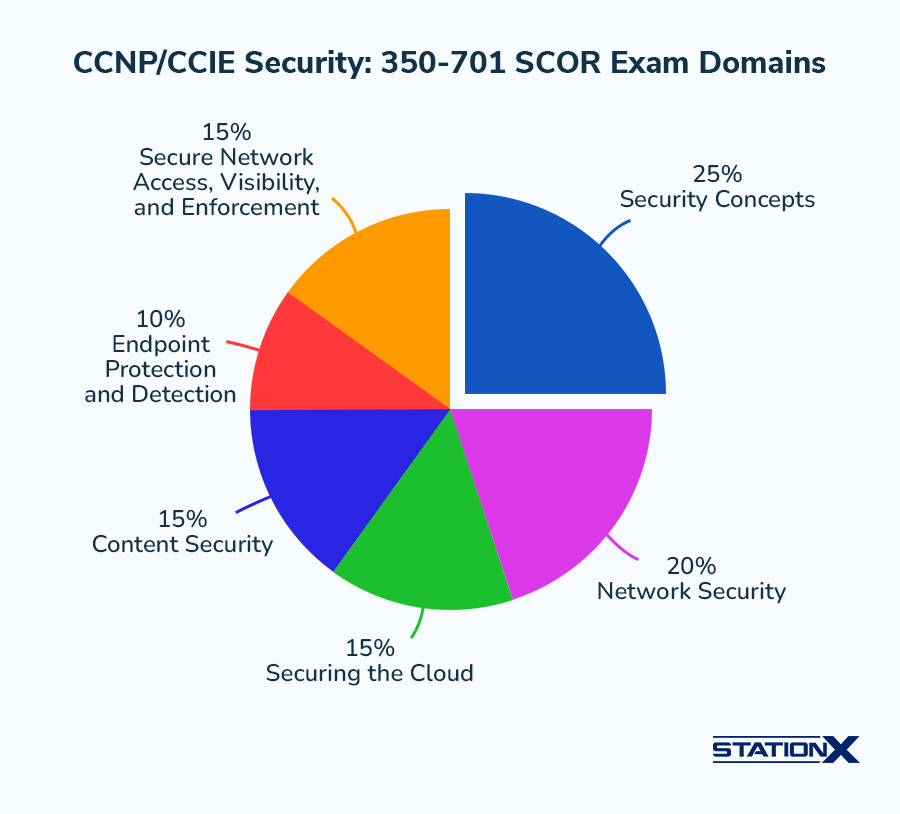
We’ve covered the essentials of the Core exam. Let’s move on to an overview of the seven CCNP Concentration Exams.
CCNP Concentration Exams
Cisco has an interesting certification mechanism concerning concentration exams: passing any concentration exam is equivalent to gaining a separate certification.
If you didn’t take the Core exam but simply did one of the concentration exams below, you won’t get the CCNP. However, you still gain a particular Cisco specialist certification, so your study efforts will be worthwhile. If you also pass the Core, you get the CCNP and specialist certifications.
Each concentration exam has 55-65 questions, lasts 90 minutes, and costs $300 USD, which you can redeem with Cisco Learning Credits. The passing scores vary but are around 75%–80%. Some may have an associated version number, such as v1.0 or v1.1, incorporating updates since the exams’ initial rollout. You can also take these exams independently of CCNP Security for Cisco recertification.
300-710 SNCF (Securing Networks with Cisco Firewalls)
If you intend to specialize in firewalls and network administration, consider the 300-710 SNCF exam.
The 300-710 SNCF exam proves you can secure networks with Cisco Secure Firewall and Cisco Secure Firewall Management Center. The specialist certification associated with this exam is “Cisco Certified Specialist - Securing Networks with Cisco Firewalls.”
The syllabus covers policy configurations, integrations, deployments, management, and troubleshooting of both products. You can find detailed exam topics here.
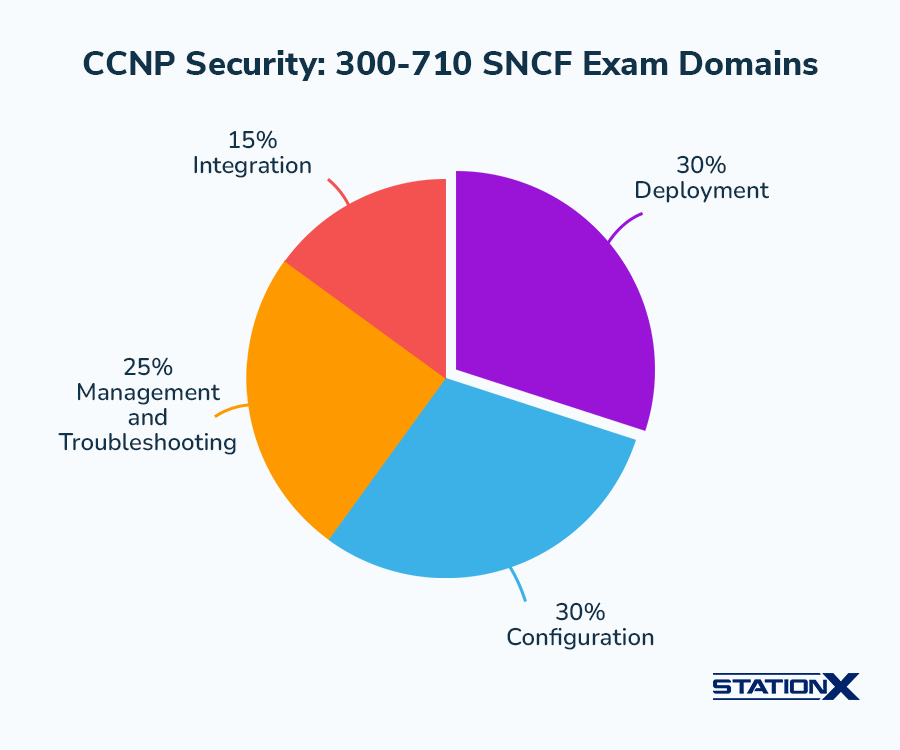
300-715 SISE (Implementing and Configuring Cisco Identity Services Engine)
If you envision a career in identity access management (IAM), the 300-715 SISE exam may be a good fit.
The 300-715 SISE exam tests your ability to deploy and use the Cisco Identity Services Engine to improve network visibility, security policy management, and operational efficiency. Besides CCNP Security, it awards the “Cisco Certified Specialist – Security Identity Management Implementation” certification to those who pass it.
The syllabus covers architecture and deployment, policy enforcement, Web Auth and guest services, profiler, Bring Your Own Device (BYOD), endpoint compliance, and network access device administration. Detailed exam topics are here.
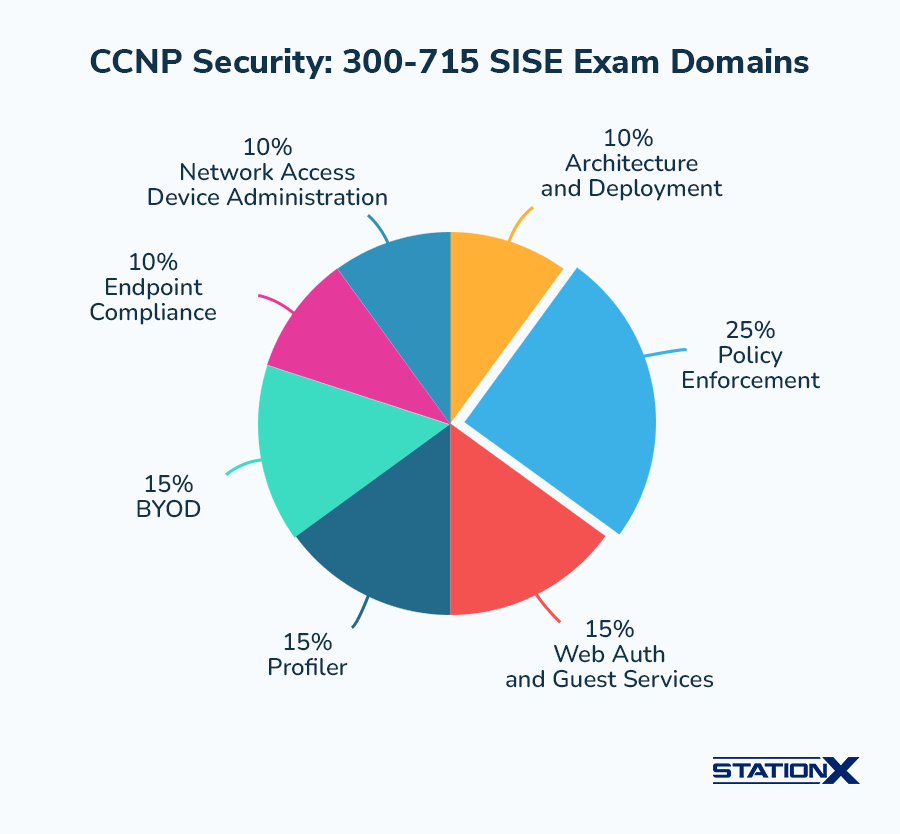
300-720 SESA (Securing Email with Cisco Email Security Gateway)
Professionals managing email communications for their companies or clients, such as virtual assistants, would enhance their security posture by taking the 300-720 SESA exam.
The 300-720 SESA exam tests your skills in using Cisco Secure Email Gateway to protect emails and streamline email security policy management. It can satisfy the CCNP Security concentration exam requirement and grant the “Cisco Certified Specialist - Email Content Security” certification to those who pass it.
The syllabus includes administration, spam control and antispam, message filters, data loss prevention, Lightweight Directory Access Protocol (LDAP), email authentication and encryption, and system quarantines and delivery methods. Learn more about the exam topics here.
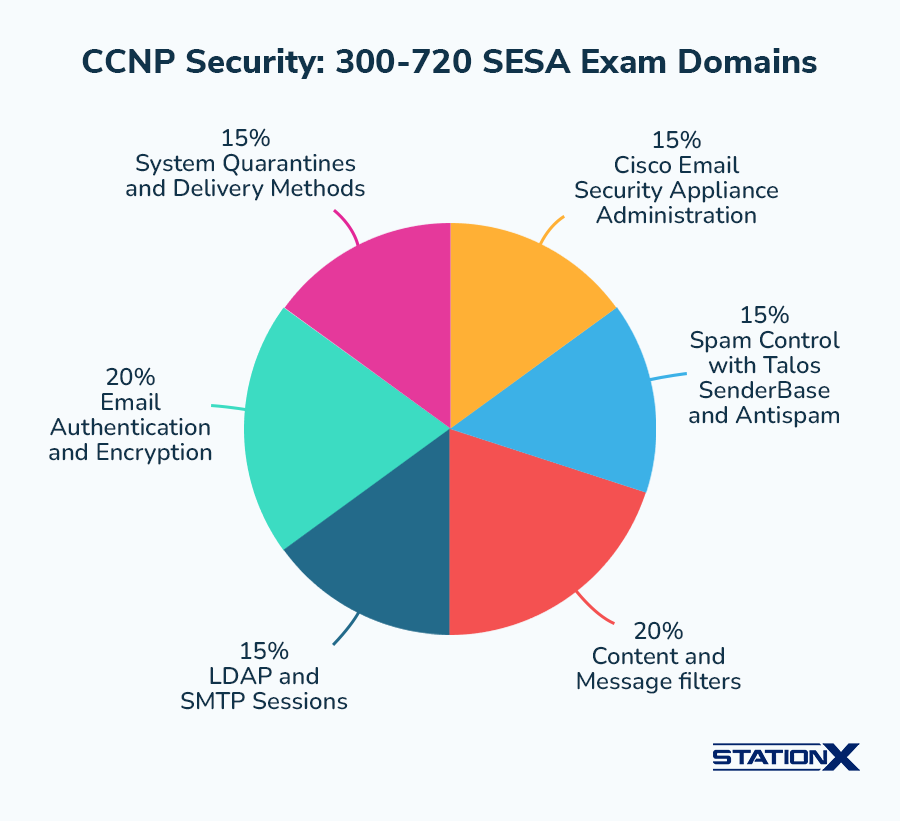
300-725 SWSA (Securing the Web with Cisco Secure Web Appliance)
Web developers and DevSecOps aficionados must pay attention: the 300-725 SWSA exam will level up your security awareness and expertise in your field.
The 300-725 SWSA exam showcases your ability to secure business emails and the web using Cisco Secure Web Appliance. In tandem with meeting CCNP Security exam requirements, it confers the “Cisco Certified Specialist – Web Content Security” certification to whoever passes it.
The syllabus includes proxy services, authentication, decryption policies, differentiated traffic access policies, identification policies, acceptable use control settings, malware defense, and data security and loss prevention. It also includes in-depth exam topics.
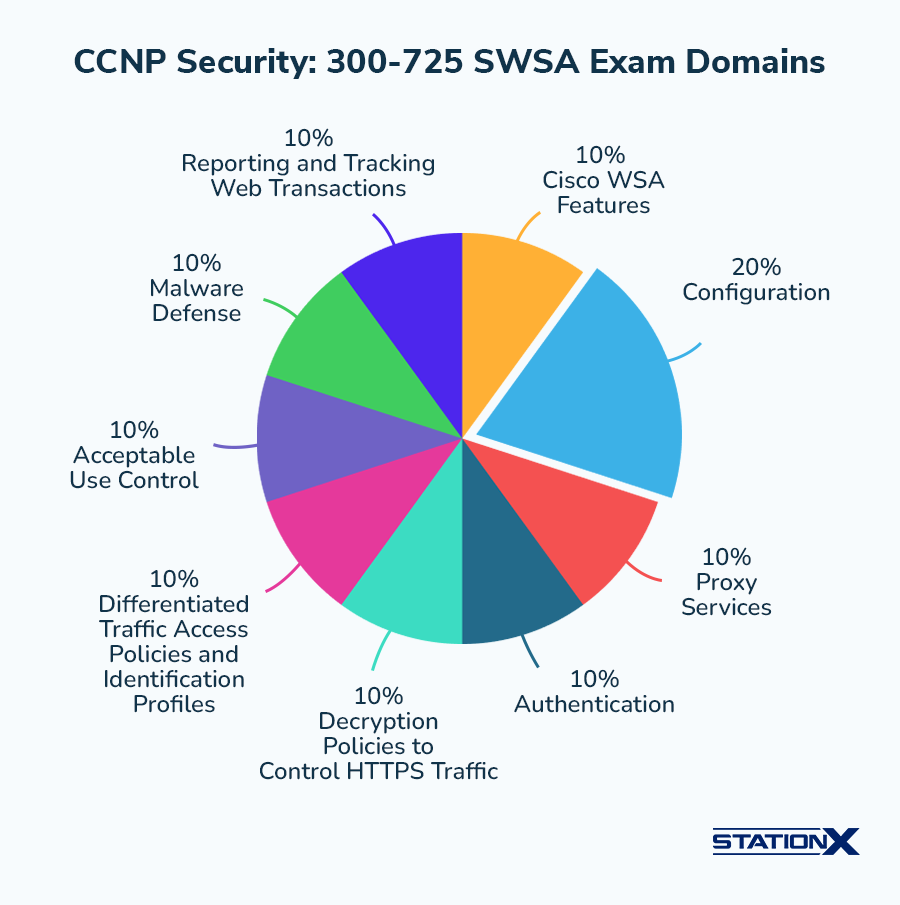
300-730 SVPN (Implementing Secure Solutions with Virtual Private Networks)
The 300-730 SVPN exam verifies your knowledge of enterprise Virtual Private Networks to create secure solutions. In addition to satisfying the CCNP Security concentration exam requirement, passing it grants the “Cisco Certified Specialist – Network Security VPN Implementation” certification.
The syllabus includes implementing secure remote communications with Virtual Private Network (VPN) solutions, including secure communications, architectures, and troubleshooting. You can find out about detailed exam topics here.
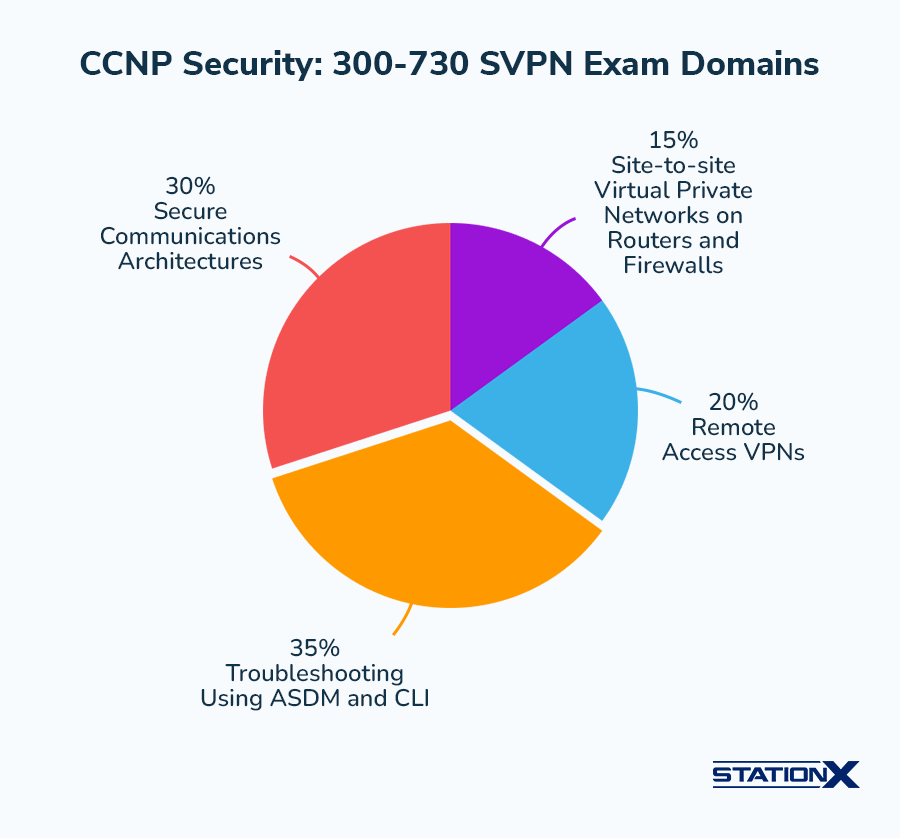
300-735 SAUTO (Automating Cisco Security Solutions)
The 300-735 SAUTO exam validates your ability to design advanced automated security solutions in a network. Apart from being a CCNP Security exam requirement, passing it awards the “Cisco Certified DevNet Specialist – Security Automation and Programmability” certification.
The syllabus includes programming concepts, RESTful APIs, data models, protocols, firewalls, web, Domain Name System (DNS), cloud and email security, and Identity Services Engine (ISE). Learn more about finer exam topics here.
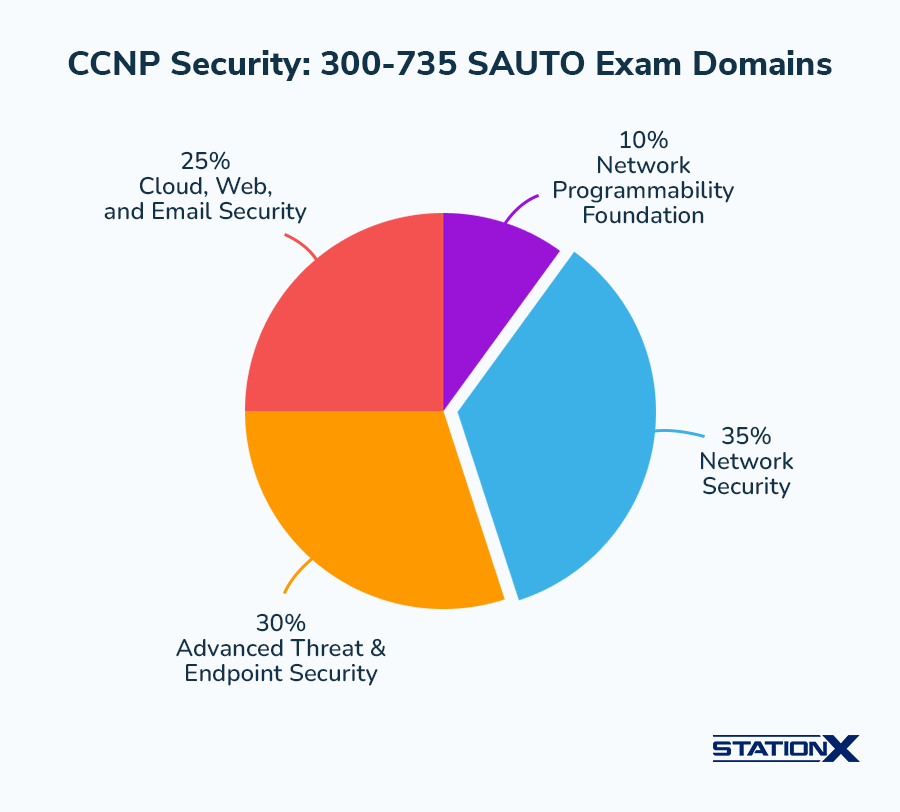
300-740 SCAZT (Designing and Implementing Secure Cloud Access for Users and Endpoints)
The 300-740 SCAZT exam certifies your knowledge of designing and implementing secure architectures, users and devices, networks, applications, data, and more. In addition to its role in CCNP Security, it confers the “Cisco Certified Specialist – Secure Cloud Access” certification upon passing the exam.
The syllabus includes designing and implementing cloud security architecture, user and device security, network and cloud security, application and data security, visibility and assurance, and threat response. To learn more about these exam topics, visit this link.
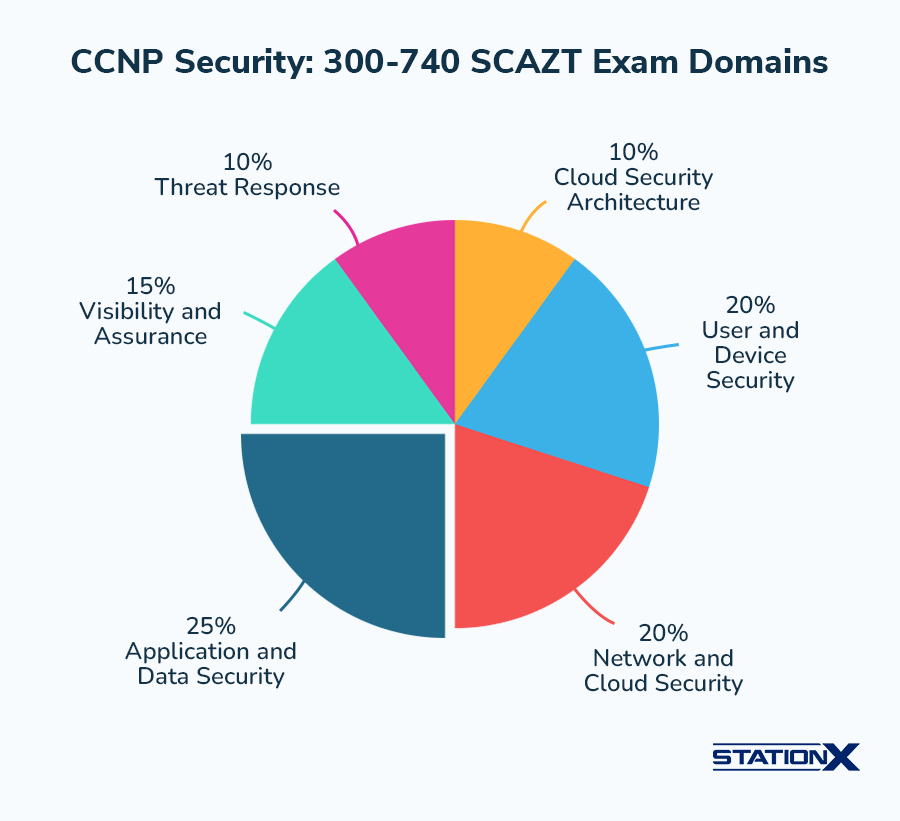
Does the Concentration Exam I Take Matter?
If you aim to pass the exams and get your CCNP Security certification as soon as possible, which concentration exam you take doesn’t matter. Passing any concentration exam suffices to meet the corresponding exam requirement.
Nevertheless, consider how your CCNP Security certification would impact or shape your future career. It’s prudent to choose a promising concentration. Each concentration will make you a specialist in a certain technology and grant you its corresponding Cisco specialist certification.
Specializing in technologies like cloud computing, automation, and identity services is worth considering, as these skills are currently in higher demand than others.
Information Security Courses Bundles
Want lifetime access to expert-led cyber security training? Explore our Information Security Course Bundles — one-time purchase packages covering top topics like Ethical Hacking, Cloud, Linux, DevSecOps, and CompTIA certifications.
CCNP Security Salary and Jobs
What are the career prospects for CCNP Security holders? How much extra money does this certification enable you to earn? We’ll find out in this section.
According to ZipRecruiter, the average yearly salary of a CCNP Security-certified employee is $152,773 USD.
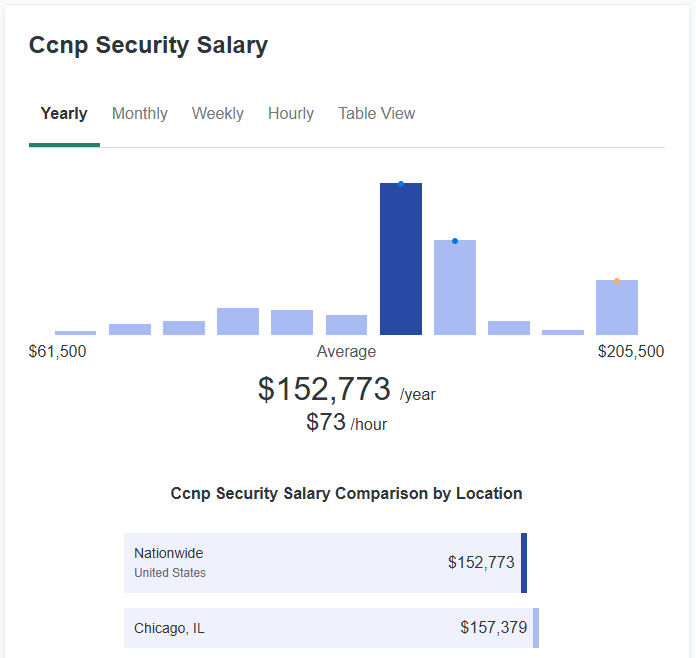
U.S. job listings mentioning "CCNP Security” indicate that this certification can lead to salaries ranging from the high five to six figures in USD.
Straightforward job searches on “CCNP Security” reveal 400+ related job ads on Indeed, 391 on Glassdoor, and 542 on LinkedIn. Therefore, there’s a demand for CCNP Security-certified individuals. Most job listings mention other cyber security certifications, such as Security+, CISSP, or CEH, so CCNP Security isn’t an end-all-be-all. Continuous study keeps your competitive edge sharp.
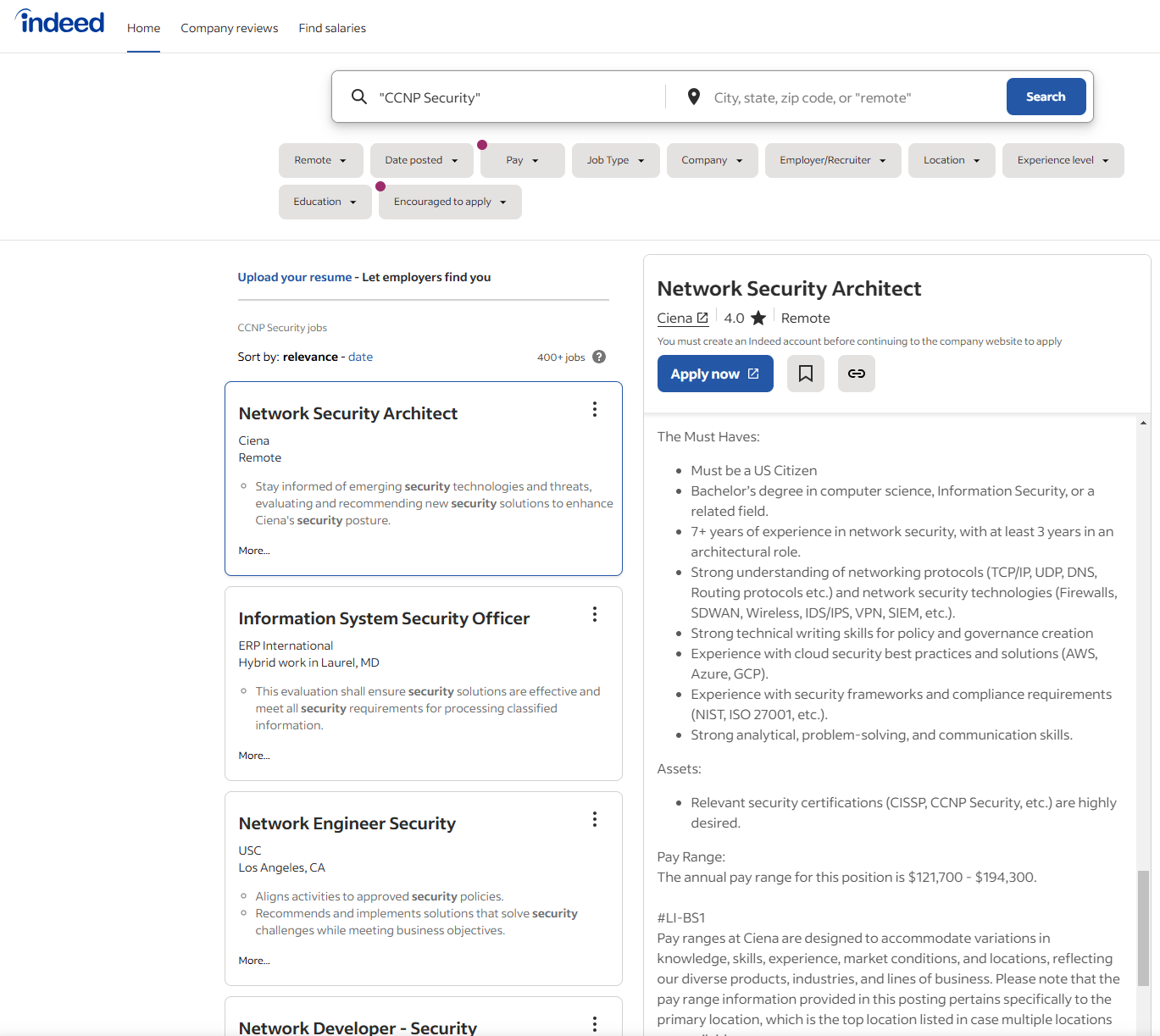
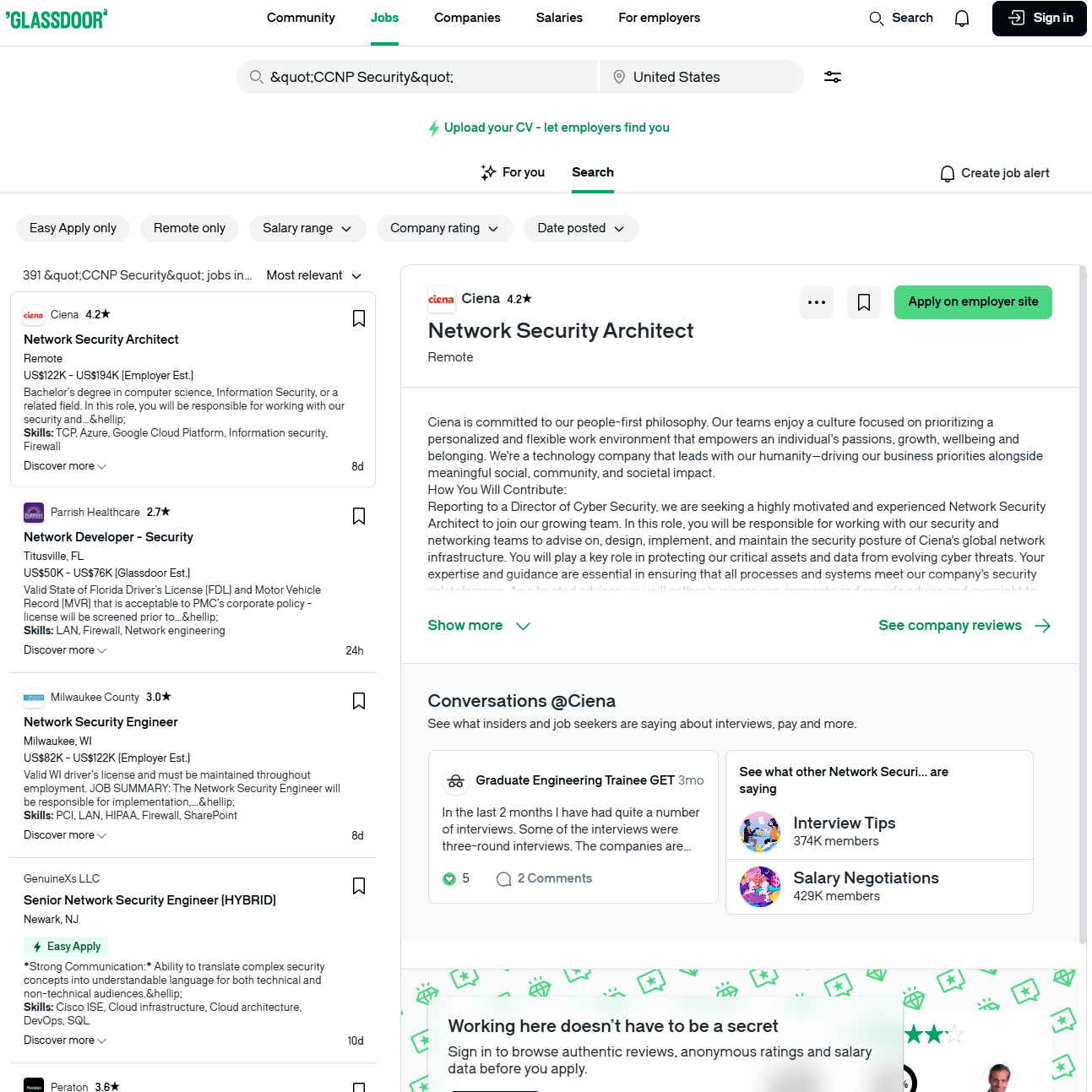
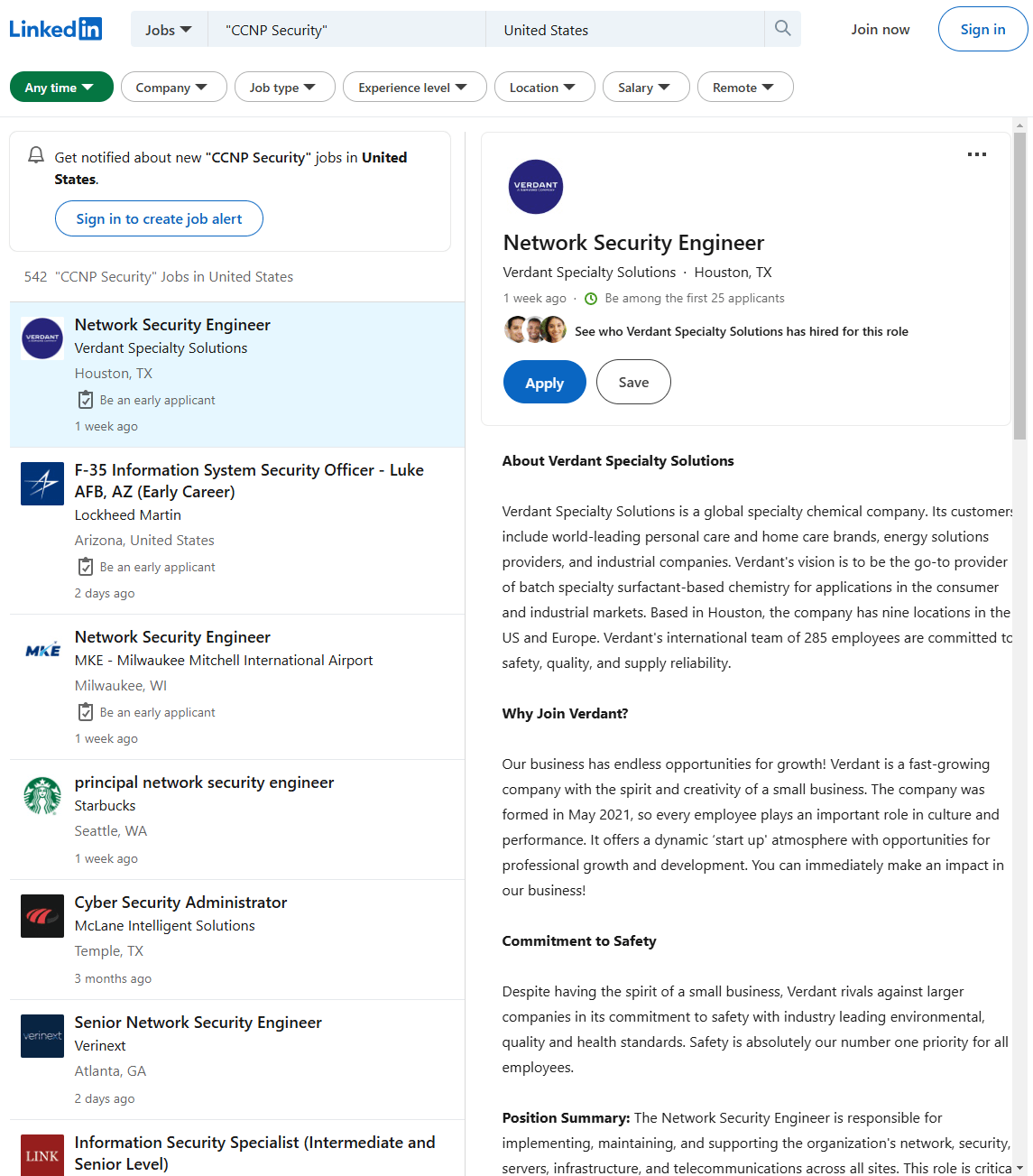
You might be wondering whether the CCNP Security certification is worth pursuing.
But to cast a wide net and play safe during your job hunt, it’s a good idea to become CCNP Security-certified while acquiring other cyber security certifications—such as those mentioned above—or accumulating cyber security experience.
Some “CCNP Security” job postings allow you to replace the required years of relevant work experience with cyber security certifications. Therefore, choosing the right certifications can boost your career and enable you to prove your abilities in some aspect of cyber security or networking.
Here are examples from Indeed showing what cyber security jobs require or prefer candidates who have the CCNP Security certification:
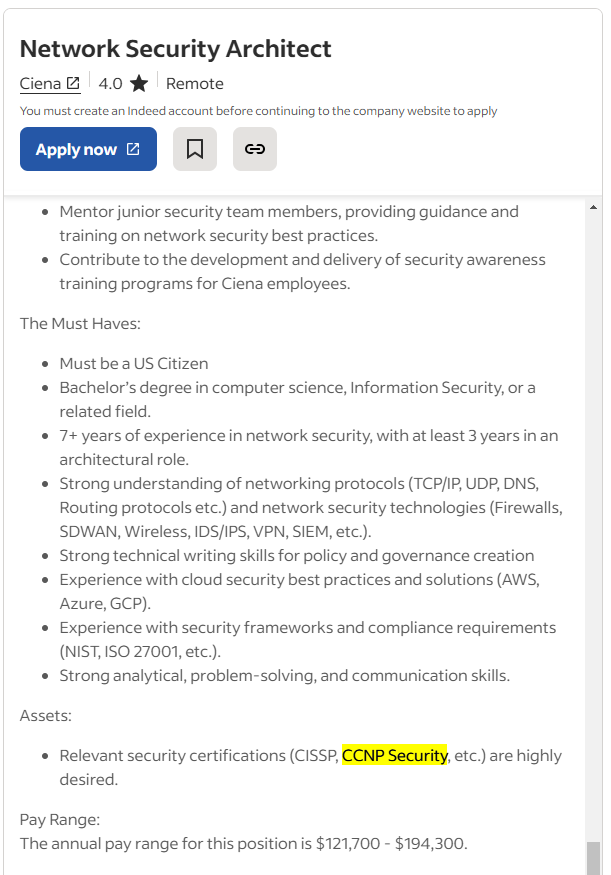
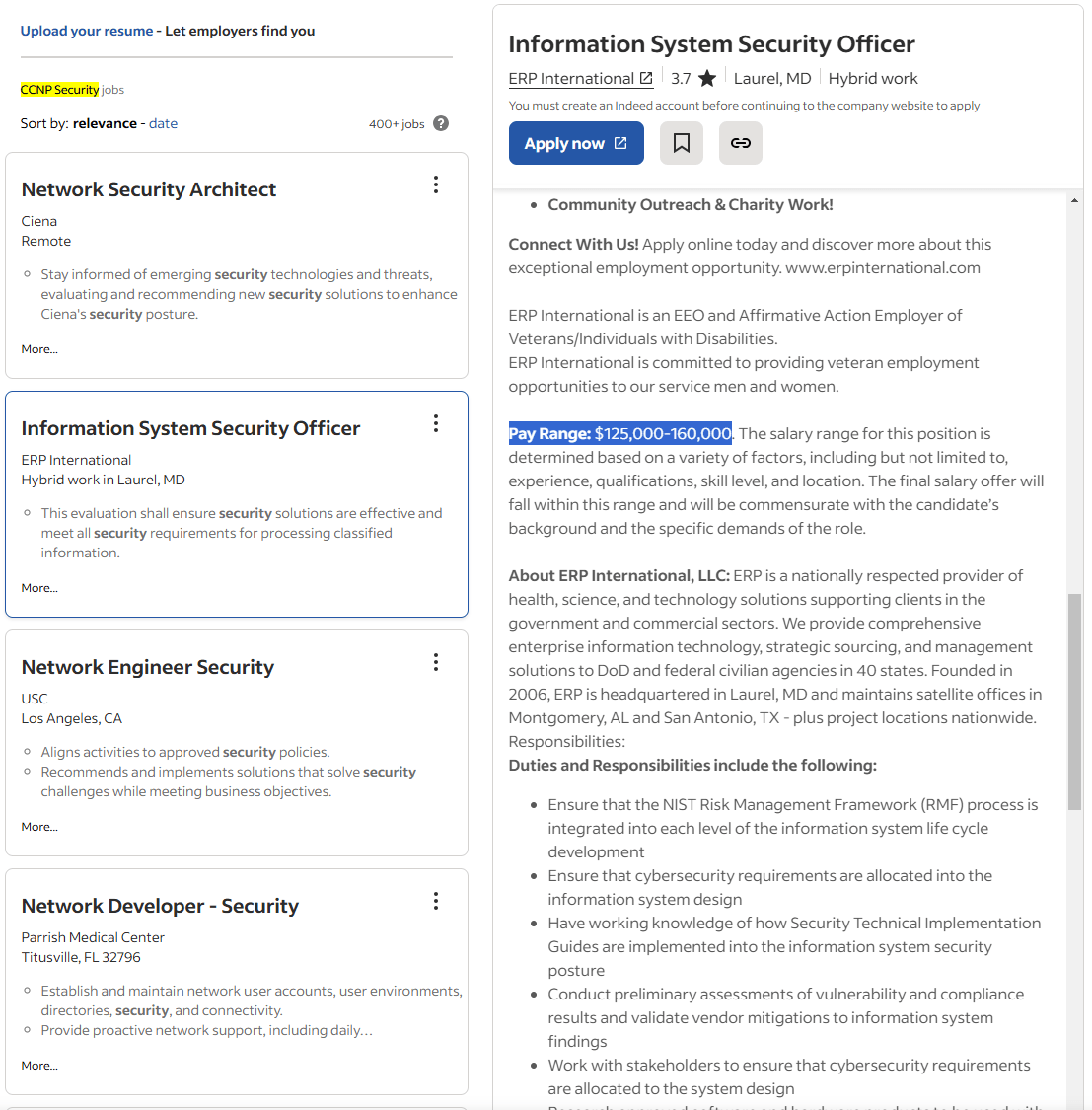
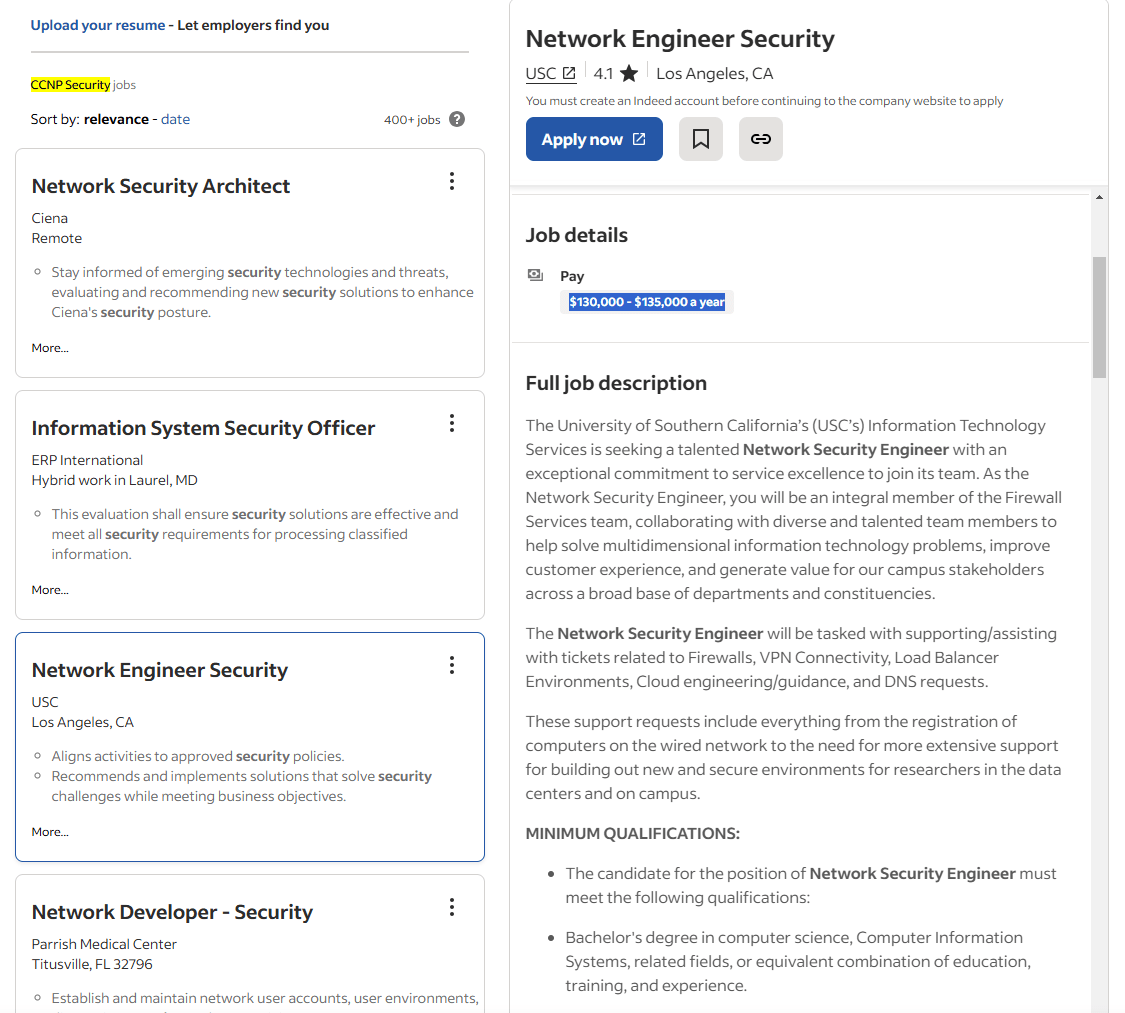
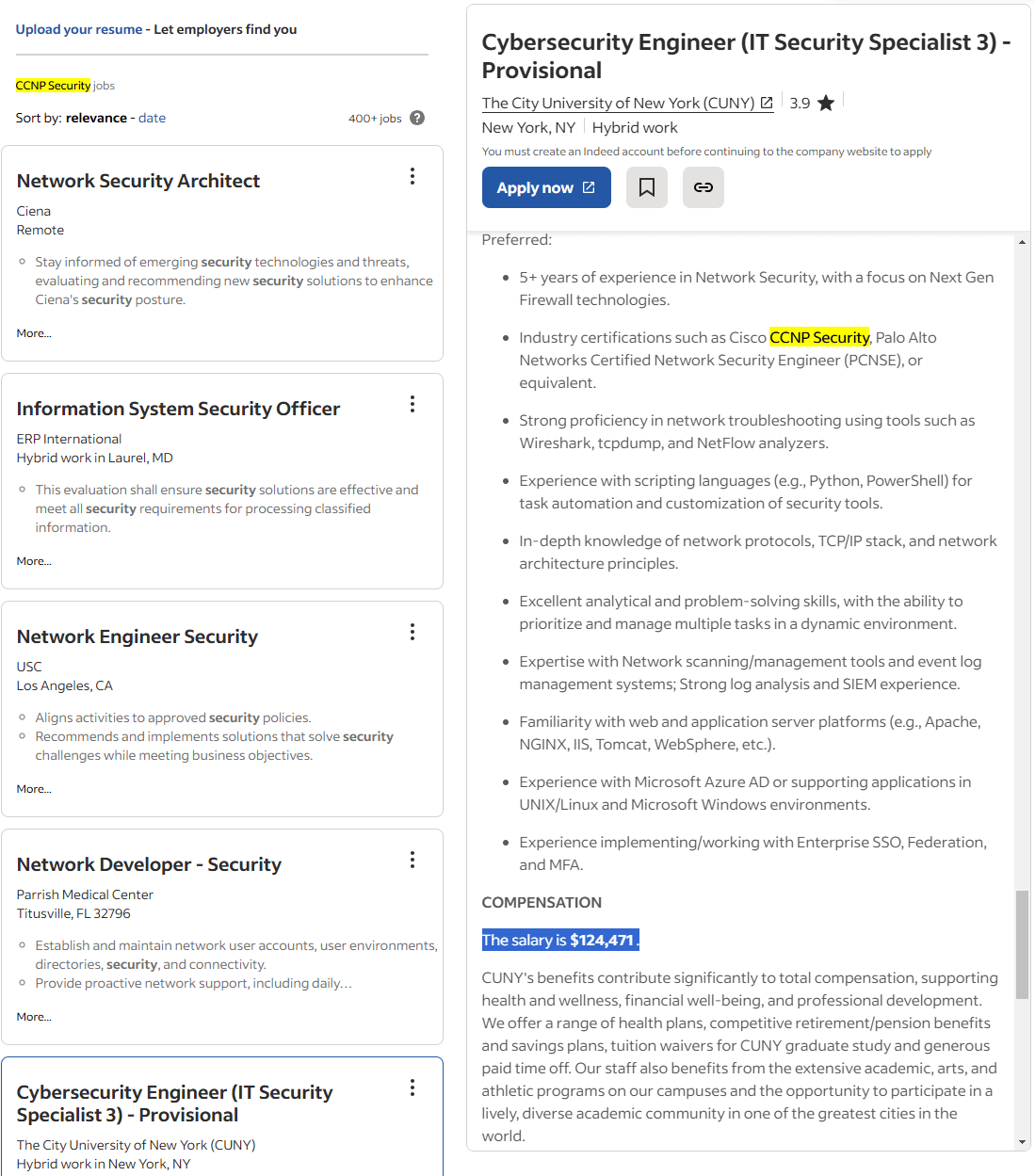
Conclusion
The CCNP Security certification will prove to enterprises your capabilities in designing and implementing cloud security architecture, user and device security, network security, assurance, and other vital security operations. You’ll also become much better at protecting your company and clients.
In this article, we’ve covered everything you need to know, including the core and concentration exams and job results, showing why this certification is worthwhile. It’s a brilliant way to level up your network security skills, and you wouldn’t want to miss out on the salary boost.
To further expand your knowledge in network and cyber security, we invite you to join our exclusive StationX Master’s Program and gain access to over 30,000 courses and labs covering all areas of networking, cyber security, and more. You’ll also join a robust community of students and mentors, gain a custom certification roadmap to meet your career goals, and much more.
Our Cisco CCNP Training Courses above can be found here:
- Cisco 350-401 Encore: CCNP and CCIE Certification Training
- Multiprotocol Label Switching (MPLS) for CCIE & CCNP Exam
- What Is EIGRP Protocol? Hands-on Networking Labs
